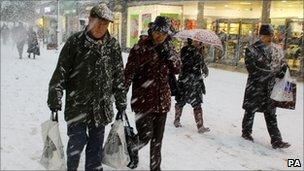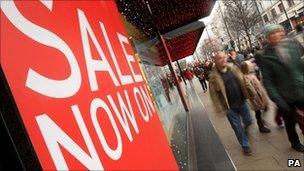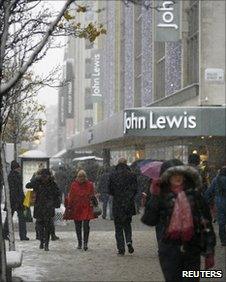What has Christmas revealed about retailers and us?
- Published
A blizzard of retailers have been reporting on how they fared over the crucial Christmas period.
And, perhaps not surprisingly, many are pointing to the freezing December weather for problems they have endured.
But what have we learned about the state of the High Street and the confidence of the consumer?
Snow nonsense?

The BRC says December's bad weather made the month an even tougher month for retailers
Pity the young children of Britain who, according to Halfords, had fewer bicycles bought for them this Christmas.
A rebellion against the two (and three) wheelers perhaps?
Not according to the retailer who insist it is just a blip, saying the only reason it has been been saddled with more bikes on its shop floors is that people were put off buying them by the snow. Not much of a gift if there is a chance you cannot play with it on Christmas morning, goes the theory.
But Halfords is not alone. The likes of Tesco, Next, HMV, Clinton Cards and Mothercare are among those saying sales over the crucial Christmas trading period were hit by December's weather.
Indeed, notes Richard Hunter of Hargreaves Lansdown stockbrokers, December's snowfall "has become the cliché of the season, replacing (at least for the moment) the 'challenging environment'".
And while naming no names, he believes some are using the weather as a "scapegoat" for a poor set of results.
After all there are still plenty of retailers who rely on visitors to the High Street and out-of-town shopping parks - JD Sports and Marks & Spencer for example - who had a good spell.
Supermarkets sweep up?
But while the snow may have been covering the streets and muddying the waters of retail analysis, until Thursday morning at least a vague picture was emerging.
While many High Street names had struggled, the supermarkets were doing well.
Customers had been piling in, loading their trolleys with turkeys, sprouts and Christmas puddings.
And then, while they were there, they were stocking up on presents of woolly jumpers, paperback thrillers, DVD box sets and digital radios too - saving themselves a trip to the High Street.
First, Morrisons reported a growth in like-for-like sales.
Then, more emphatically, Sainsbury's announced its "best ever" Christmas, despite the "challenging weather conditions" as the UK's third-largest supermarket chain said non-food sales had grown particularly strongly.
However the supermarket theory lost a bit of momentum after Tesco came in with a much more modest performance - and while those top-of-the-range mince pies had gone down well, growth in sales of non-food goods was "subdued".
This was compared with a strong year in 2009, the world's third largest retailer said, and there was the "weather disruption for customers travelling to larger stores" to consider too.
But it was enough to disappoint investors and send Tesco shares lower.
"This below-par performance from Tesco will raise an eyebrow or two in the market and the industry," say analysts at Shore Capital Stockbrokers.
However for a sweet insight into the continued importance of the supermarket, look no further than Thorntons.
Its High Street shops saw sales fall by almost 6% over Christmas - which along with Valentines Day and Easter is traditionally its busiest period.
But demand for its chocolates overall was up by nearly 4% thanks to sales in other outlets - principally the supermarkets.
Consumer says No?

The post-Christmas sales were also a chance to beat the VAT rise
So if many High Street stores have suffered, and the likes of Tesco have not taken up the slack, where were all those gifts being bought?
Certainly the department stores did well, despite having to contend with the same weather.
John Lewis enjoyed sales growth of 7.6% over Christmas, while House of Fraser, which has 61 stores, also had a bumper season with growth above 8% - perhaps, it suggested, because of the one-stop-shop they offer.
But the British Retail Consortium says that overall, sales declined 0.3% on a like-for-like basis in December 2010.
And according to industry experts Verdict Research - it may not just have been the bad weather that hit consumer spending.
"Retailers were expecting a bit of a last hurrah at Christmas because of what has happened in the past few years," says Matt Piner, an analyst at the firm.
"Previously customers have tended to throw caution to the wind and Christmas was the time of year where, if they were a bit low on confidence, they'd still spend.
"This year it feels they have finally been more cautious and that worries about inflation and job security have felt more real."
He added that while the weather had been disruptive, it had "given consumers an excuse to reign in spending".
"There has been less of an opportunity to make the off-the-cuff purchases people normally make a lot of at Christmas," Mr Piner says.
"Consumers were a lot more discerning, getting what they need rather than the discretionary things."
And with pay rises - if they are awarded at all - tending to lag well beyond inflation, and the VAT rise pushing up prices of most goods and services, there are many other reasons why consumers are feeling squeezed.
Did we click?
On the face of it, Christmas 2010 was a triumph for online shopping.

John Lewis says uncertainty about deliveries brought customers to stores
Monday 7 December was designated Cyber Monday, with Brits spending some £350m in a single day online as they got stuck in to festive shopping.
And research group IMRG expects December sales will have been well above its earlier forecasts of 16% growth on 2009.
"Parts of the UK were completely shut off and people increased the amount of shopping they did from the comfort of their homes," says IMRG's managing director, David Smith.
The early snowfall at the end of November caused a surge of online sales activity, he adds, with the gifts sector recording a month-on-month increase of 123%.
But online retailers have not had it all their own way.
True, many retailers saw e-commerce boom as in the first snow fell, making shopping at home with credit card in one hand and steaming mug of tea in the other far preferable to slipping and sliding down the ungritted High Street.
But then there was a reversal in this trend, as doubts arose about whether deliveries would reach homes in time for Christmas.
Online retailers warned of delays as backlogs of parcels built up at depots that could not be reached by lorry. Some firms stopped online sales completely - or brought forward their guaranteed Christmas delivery deadlines.
And there has been a suggestion that the uncertainty drove people back to the stores.
"When the weather turned for a second time closer to Christmas, shoppers wanted the reassurance of having their goods in their hands and our shops saw sales surge as a result," says John Lewis managing director Andy Street, though his business did manage to generate about £545m worth of online sales.
Tesco Direct saw its online sales climb by 18% while they were up by 25% at Marks & Spencer.
Meanwhile firms that allowed customers to buy online but collect items themselves - essentially getting the benefit of cheaper prices without being at the whim of delivery companies - also seem to have seen results.
House of Fraser credits the launch of such a service as part of the reason for its sales holding up in the cold snap.
And High Street stalwart Argos says the internet represented 38% of its sales, worth more than £700m in the last four months of 2010 and up from 35% in 2009. About three quarters of these were online reservations - where customers then came to stores to pay for and pick up products.
But then again, overall sales at the catalogue stalwart were down about 4%, adding to the mixed and confusing picture.